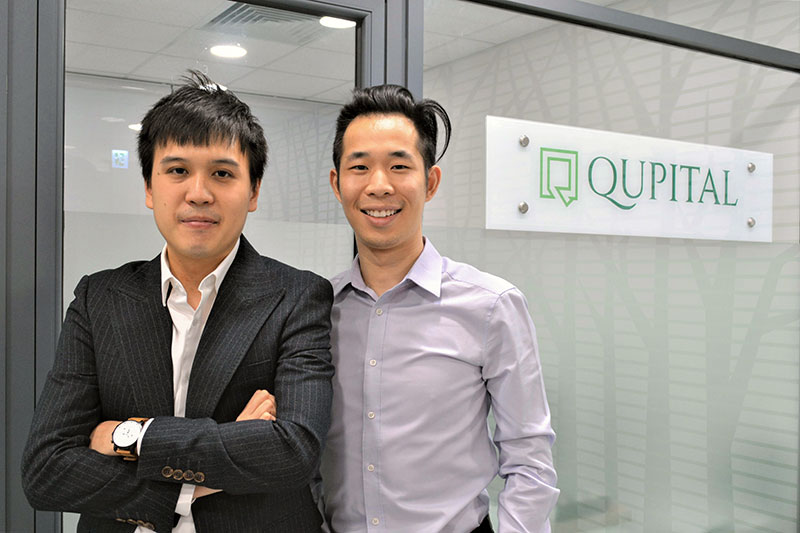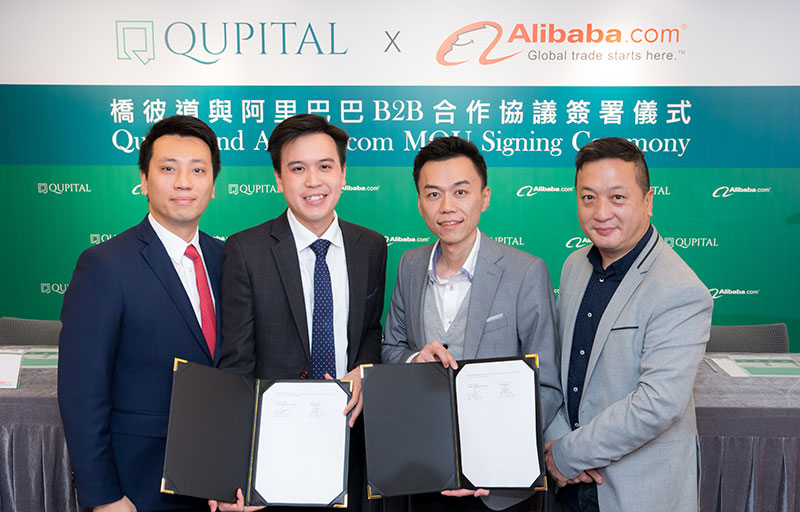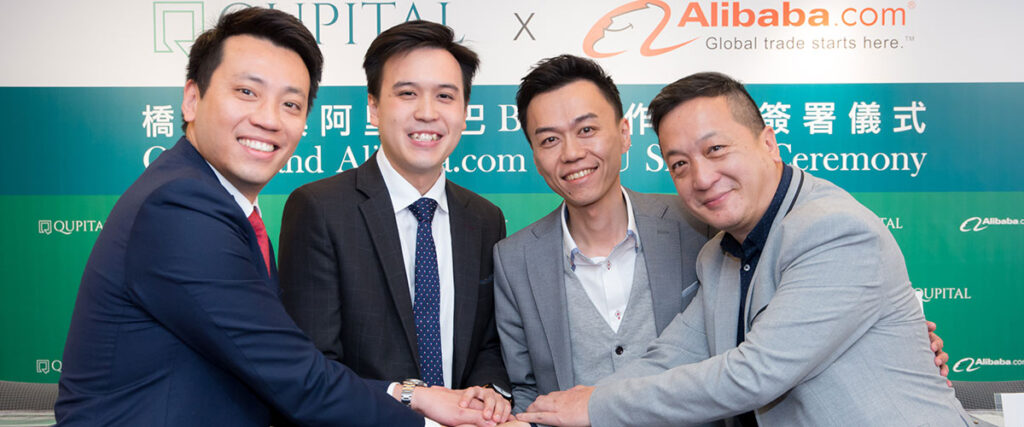With Qupital, Hong Kong’s first online invoice financing service provider, forming a partnership with e-commerce giant Alibaba, the future looks nothing if not bright.
Hong Kong’s first and largest online invoice discounting exchange is the brainchild of mid-20-year-olds Andy Chan and Winston Wong, and it serves to address the serious lack of efficient SME financing solutions in the city’s current market. To put it simply, Qupital’s online invoice trading platform helps SMEs free up the cash that’s normally tied up in invoices outstanding by matching the companies with funders who will give out loans in exchange for a return on their investment. The loans involved will cover up to anywhere between 80 per cent and 95 per cent of the invoice value, with investors seeing a return within a period of 30-120 days, resulting in equitable win-win opportunities for all involved. We talk with CEO and Co-founder Andy Chan to learn more about Qupital, and explore the various challenges that come with being a young entrepreneur in Hong Kong.

Though born and raised in New Zealand, Andy went on to study in the States, gaining a B.A. in Computer Science and Economics at the prestigious Brown University in 2014. It was there that he first became interested in account receivables, short-term amounts due from buyers to a seller who have purchased goods or services from that seller on credit. ‘When I was in college, a friend of mine 3 years my senior, went on to work in New York at a company called the Receivables Exchange, an auction-based marketplace that connects large sellers of trade receivables to a broad network of institutional buyers. Whilst there are a lot of similar companies in Europe, the same cannot be said for Hong Kong, and that got me thinking’, begins Andy.

More than a quarter of Hong Kong’s 330,000 SMEs have reported that the lack of access to working capital created a major barrier to those wanting to grow and expand globally. Andy, spotting a gap in the market, knew he wanted to create a platform that would address Asia’s reported USD 200 billion SME financing gap by allowing clients to turn their account receivables into cash. ‘Qupital is a marketplace, so there are two sides. On the one side are the SMEs who sell products or services, and usually have to wait for their customers to pay them in 60-90 days. And then on the other side are the professional investors, or “funders”, who are looking for a short-term investment from which they can get a nice and attractive return. Qupital sits in the middle, vetting sellers and verifying their invoices for the professional investors to then purchase’, explains Andy.
At the moment, Qupital serves a wide range of SMEs in the export, manufacturing, distribution and service sectors. Andy tells us that ‘Hong Kong is actually the 7th largest exporter in the world, ranked even higher than countries like the UK. The traditional industries that Hong Kong has been really strong at export-wise are garments, electronics, and toys. Then for importers, it’s mainly food and cosmetic products. These are usually smaller companies with between 5-20 people, and annual turnovers of between HKD 20-200 million. These are the companies that are underserved by the traditional banks and are the ones that need Qupital the most.’
With the accounts receivables market in China being more than a whopping USD 3 trillion annually, it’s unsurprising that Andy, after a short stint working as a software engineer at the legal tech startup Swiftcourt in Denmark, decided to make the move to Hong Kong in 2015. It was here, during a friendly game of basketball, that Andy met the guy who would soon become his co-founder, Winston Wong. Explaining their partnership, Andy says, ‘When we first met, he was still working full time at Bank of Tokyo – Mitsubishi UFJ (MUFG), but I could see he had a lot of passion and commitment for this project as he would always come meet me after hours and during the weekend to work on the business, despite having to regularly do OT at MUFG. On top of that, our skill sets are very complimentary, as he’s very experienced in trade finance and account receivables, whereas I’m more of a tech guy. From day one we clicked as friends, and it wasn’t long before we realised that we also clicked well as co-founders.’
From March to August 2016, the boys worked furiously night and day in preparation for the hotly-anticipated launch of their online invoice discounting exchange platform. At launch, Andy and Winston were only 24 and 25 years old respectively and were the only two employees of Qupital all the way up to May 2017 – a situation which led to some rather innovative sales techniques. “When going to pitch clients, Winston and I would print multiple business cards with different titles to give the impression that our company was made up of more than just the two co-founders’, divulges Andy. ‘I even grew facial hair to present a more mature look to potential clients and investors’.
Today, the company sits with a team of over 30 employees headquartered in Hong Kong and expects to be profitable by the end of May or June this year. ‘We definitely have a really young team, with the average age being around 25/26 years old’, says Andy. ‘So we’re very low to the ground and are able to be quite nimble and adapt to the market as and when we get feedback. We also have a very flat management structure whereby everyone’s opinions and ideas can be voiced. Since it’s the first project Winston and I are leading, we always try to take their input and opinions to heart.’
The boys have certainly come along way since that first meeting on the basketball court. In May 2017, less than a year after they launched, Qupital managed to secure a seed investment round of USD 2 million. The financing was led by Hong Kong-London venture capital firm MindWorks Ventures and the USD 130 million not-for-profit Alibaba Entrepreneurs Fund, Aria Group and other backers also participating. As a direct result of their highly successful seed round, Qupital has since managed to raise a further USD 850k from various convertible notes along the way.
Despite sitting, in Andy’s words, ‘very healthy in terms of fundings’, Qupital has its eyes set on raising their Series A by the end of this year. The primary goal behind this funding round would be to expand outside of Hong Kong and reach the rest of Southeast Asia, specifically Taiwan, Singapore, Vietnam, Thailand, Malaysia and Indonesia. ‘We see Hong Kong as one of the more overbanked markets’, explains Andy. ‘There’s actually a lot of growing businesses in Southeast Asia, but the funding of the banks are not able to keep up with their growing needs of capital. We’re lucky in that the market in Southeast Asia is very large in terms of the opportunities that we can provide them’.
Whilst he accepts that Hong Kong is a bit slower on the curve with regards to technology developments, he is quick to affirm that it’s a great location for startups. ‘Hong Kong has a number of great universities, so there’s a constant pool of talented young people coming out of these schools every year. Another advantage Hong Kong has is that it’s a financial hub. There’s a huge amount of capital here, and a great number of potential angel investors to help get your startup off the ground.’
When asked if he had any advice for aspiring entrepreneurs Andy replies, ‘Learn to know what your strengths and weaknesses are so you can find a good co-founder that compliments you.’ Having already processed a total of over 600 trades and gained a total GMV (gross merchandise volume) of over HKD 350 million within its first 2 years of operations, Qupital is definitely a Hong Kong startup to watch in 2018. And with the backing of such an esteemed and successful company as Alibaba, coupled with their impending Southeast Asia expansion, we’re confident that this won’t be the last you hear about Hong Kong’s first online invoice discounting exchange.





